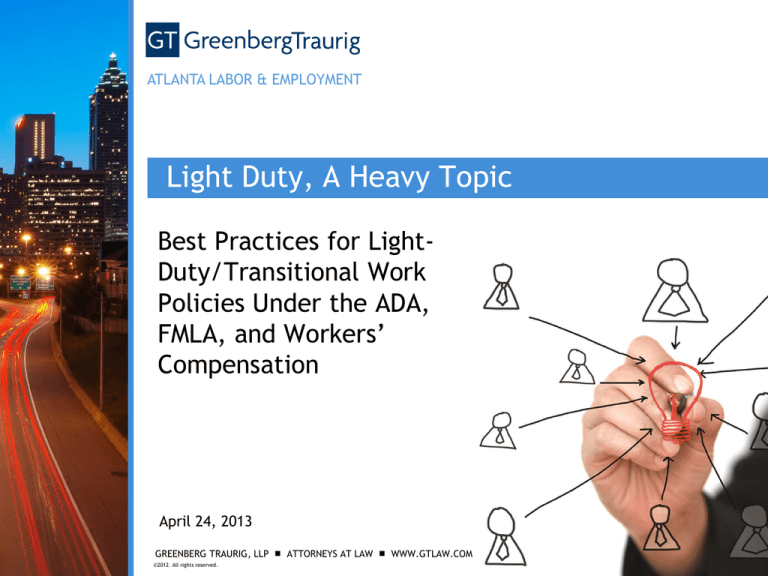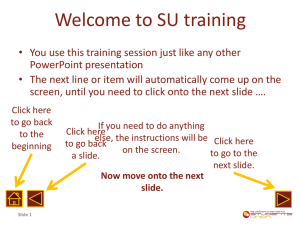
ATLANTA LABOR & EMPLOYMENT
Light Duty, A Heavy Topic
Best Practices for LightDuty/Transitional Work
Policies Under the ADA,
FMLA, and Workers’
Compensation
April 24, 2013
GREENBERG TRAURIG, LLP ATTORNEYS AT LAW WWW.GTLAW.COM
©2012. All rights reserved.
Three Overlapping Laws
ADA
Workers’
Compensation
FMLA
Light Duty
| ATLANTA LABOR & EMPLOYMENT
ONE CARDINAL RULE
The ADA, the FMLA, and Workers’ Compensation
statutes confer different rights on employees, and
different obligations on employers. Therefore,
compliance with one statute does not at all
guarantee compliance with the other(s).
| ATLANTA LABOR & EMPLOYMENT
A LITTLE BACKGROUND….
ADA at a glance
□
The Americans with Disabilities Act (“ADA”) prohibits covered
employers from discriminating against employees and
applicants who are “qualified individuals with a disability.”
Employers cannot discriminate against an individual based upon
his or her association with a disabled person (i.e., if the
employee has a child or spouse afflicted with a disability).
□
Employers with 15 or more employees must, in most cases,
comply with ADA.
□
A qualified individual with a disability – protected by the ADA –
is a person who can perform the essential functions of his or
her job with our without a reasonable accommodation.
□
Employers must provide reasonable accommodations to
qualified individuals with a disability.
| ATLANTA LABOR & EMPLOYMENT
A LITTLE BACKGROUND….
FMLA at a glance
□
The Family Medical Leave Act (“FMLA”) establishes a minimum standard for
leave, much as other federal laws set standards for child labor, minimum wage,
safety and health, or pension and welfare benefits.
□
Employers with 50 or more full-time employees must, in most cases, comply with
FMLA.
□
FMLA does not cover part-time or seasonal employees working fewer than 1,250
hours per year.
□
Eligible employees may be entitled to 12 weeks of unpaid leave during any 12
month period for:
The birth of a child and to care for the child
The placement of a child with the employee for adoption or foster care
To care for a spouse, son or daughter, or parent who has a serious health
condition
A serious health condition that makes the employee unable to perform the
functions of the employee’s job
| ATLANTA LABOR & EMPLOYMENT
A LITTLE BACKGROUND….
Workers’ Compensation at a glance
□
State workers’ compensation laws seek to compensate
employees for workplace injuries while minimizing
employer liability. Most state workers’ compensation
laws protect both injured workers and their dependents
from the costs associated with occupational injury,
disease or death.
□
Employers must meet the insurance requirements of the
law or they may be subject to fines.
□
Employers who pay into the state Workers’
Compensation fund or who are self-insured are normally
not subject to civil liability for workplace injuries or
death unless its employees can establish an intentional
tort on the part of the employer.
| ATLANTA LABOR & EMPLOYMENT
What Constitutes the Light Duty Overlap?
FMLA: only serious health conditions of the
employee
□
Not pregnancy or serious health conditions of family
members
ADA: actual disabilities
□
Not record of disability or regarded as disabled
Workers’ Comp: injuries/illnesses precluding
full return to work
□
Not a short-term injury resulting in complete recovery
| ATLANTA LABOR & EMPLOYMENT
What do we mean by “light duty”?
Temporary or permanent work that is physically
or mentally less demanding than normal job
duties.
Other common uses of the term:
□
Excusing certain job functions
□
“Office” jobs v. “field” jobs
□
Other permanent positions generally considered “easier”
| ATLANTA LABOR & EMPLOYMENT
Are Light Duty Positions Required?
No....
But remember….
ADA – Required to be offered if it is a reasonable
accommodation that does not create an undue
hardship on the employer
FMLA – Employee covered by the FMLA cannot be
required to take a light duty job in lieu of remaining
on FMLA leave
Workers’ Compensation – Ought to be offered if
available as it may eliminate the employee’s
entitlement to the wage replacement benefit
| ATLANTA LABOR & EMPLOYMENT
Does the employee have to accept light duty?
Under Workers’ Comp? Employee who refuses
medically appropriate light duty work will lose
benefits unless the refusal was justified.
Under ADA? Employee must accept light duty as
long as it is a reasonable accommodation and is
effective in allowing the disabled employee to
return to work or continue working.
Under FMLA? No. Employer is not permitted to
require an employee entitled to FMLA leave to
take a light duty position in lieu of FMLA leave
of absence.
| ATLANTA LABOR & EMPLOYMENT
Light Duty Position Variations…
There are at least four significant types of light
duty assignments:
1. Temporary position
2. Restructuring of employee’s usual position
3. Reassignment to a vacant existing job
4. Modified work day
| ATLANTA LABOR & EMPLOYMENT
Benefits of Light Duty Positions
Employer gets at least some benefit from work
□
Reduce potential liability under the ADA
□
Increase morale
□
Increase productivity by reducing absences
Can help reduce turnover
□
The longer an employee is out, the less likely he is to ever
return
Can cut off or control workers’ compensation costs
Disability is much more than workers’ compensation costs
□
Nationally, there were 110 million lost workdays in 2008
70 million of the lost workdays were from injuries
| ATLANTA LABOR & EMPLOYMENT
Drawbacks to Light Duty Positions
Risk of re-injury to the employee
Inefficiencies arising from new position
Administrative hassle to add a new job
Might require you to keep an employee you’d
rather see go
Any others?
| ATLANTA LABOR & EMPLOYMENT
How to Implement Light Duty Positions
Permanent slate of light duty positions
□
Pros
One-time set-up
Defined role in the organization
Readily accessible job descriptions
□
Cons
Cannot be reserved for occupational injuries
Can encourage malingering
| ATLANTA LABOR & EMPLOYMENT
How to Implement Light Duty Positions
Ad hoc Light Duty Positions
□
Pros
Can be tailored to specific business and individual needs
Can be reserved for occupational injury only
Can be disregarded except when filled
□
Cons
Takes time to create a position and job description
Limited time to take advantage of Workers’ Comp limits
Ad hoc positions may have poorly defined performance
expectations and metrics
| ATLANTA LABOR & EMPLOYMENT
Legal Principles to Keep in Mind
ADA does not require employers to create new
positions
ADA does not require “bumping” incumbent
employees
Under FMLA, light duty must be “voluntary” and
“uncoerced”
Light duty time does not count against FMLA’s 12
weeks
Policies and performance expectations continue
to apply in light duty jobs
| ATLANTA LABOR & EMPLOYMENT
Legal Principles to Keep in Mind
Workers’ Compensation
□
Employers can cut off or reduce workers’ comp liability
by offering light duty.
□
Check your state Workers’ Compensation Statute for all
the procedural steps required.
| ATLANTA LABOR & EMPLOYMENT
Best Practices
Create light duty positions on an ad hoc basis
Limit creation of light duty positions to occupational injury or
illness
Make all light duty positions temporary
□
Best to have a defined time period (e.g., 90 days)
□
Consider creating a Light Duty Offer form that clearly states
the time limitations on the position; the employee should sign
the form to certify that she accepts a light duty position and
understands the assignment is temporary (and thus she has no
entitlement to the position)
Have a written job description for each light duty position
Any other job modifications should be handled as reasonable
accommodations or FMLA leave – not “light duty”
| ATLANTA LABOR & EMPLOYMENT
What do you think?
If an employer reserves light duty positions
for employees with occupational injuries,
does the ADA require it to consider
reassigning an employee with a disability
who is not occupationally injured to such
positions as a reasonable accommodation?
| ATLANTA LABOR & EMPLOYMENT
What do you think?
Does an employer have a duty under the
FMLA to return an employee on leave to his
job if that employee cannot perform
essential functions of the position?
| ATLANTA LABOR & EMPLOYMENT
What do you think?
ABC Widgets, Inc. (“ABC”) creates light duty positions for
employees when they are occupationally injured if they
are unable to perform one or more of their regular job
duties. Ann learns she is pregnant. Her doctor placed
her on bed rest for two weeks, and, later, placed her on
light duty restrictions. She requests that ABC create a
light duty position for her as a reasonable
accommodation. ABC denies Ann’s request because she
has not been injured on the job. The company’s
modified work policy denies an accommodation of light
duty work for non-work related injuries. Has ABC
violated the ADA?
| ATLANTA LABOR & EMPLOYMENT
What do you think?
Nurse Betty suffered a work-related injury to her neck
and right shoulder while on the job at County Hospital.
Betty’s job requires she be able to light 50 pounds.
However, her physician limited her to occasional lifting
of no more than 20 pounds due to her injury. She was
initially awarded a light duty assignment through the
hospital’s light duty program. While on light duty, she
was also granted intermittent FMLA leave. After Nurse
Betty exhausted her FMLA leave and still could not
perform the essential functions of her job, County
Hospital refused to reinstate Nurse Betty to its light duty
program.
Did County Hospital violate Nurse Betty’s FMLA rights
when it removed her from the light duty program and
placed her on continuous FMLA leave?
| ATLANTA LABOR & EMPLOYMENT
ATLANTA LABOR & EMPLOYMENT
QUESTIONS
GREENBERG TRAURIG, LLP ATTORNEYS AT LAW WWW.GTLAW.COM
©2012. All rights reserved.








